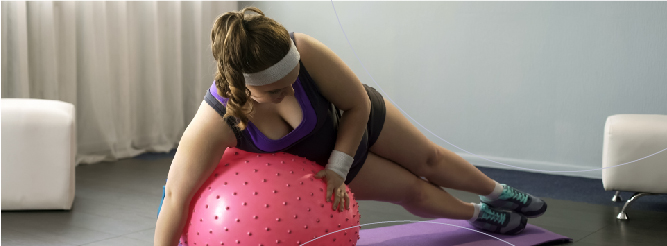
Exercise has proven to be an important part of our daily life because it helps us achieve overall wellness, both physically and mentally. There are many reasons people take up any kind of exercise, whether it’s to meet certain fitness goals, as a hobby, or to improve their health by losing weight.
The benefits that can be achieved through exercise vary according to the type of activity you choose to participate in, such as yoga, resistance training, cardio workouts, or pilates. But one thing’s for sure, leading an active lifestyle not only helps us get and stay in shape, but it also decreases our chances of developing illnesses.
If you’re new to working out, you’re probably wondering which exercise is best for you and there are plenty of options to choose from. Cardio workouts are usually the go-to for people that are looking to shed some extra pounds because of their fast-paced, high-intensity routines. Weight training is another workout recommended for building strength and for losing weight without decreasing the body’s muscle mass
While these types of workouts are effective, they’re not the only available options for people looking to embark on their weight loss journey.
However, if you want an exercise that’s low-impact and that you can even practice at home, Pilates may be just the option for you because it prioritizes “alignment, breathing, developing a strong core, and improving coordination and balance” [1]. Whether you look up videos on the Internet or attend a class in your local studio, you’ll notice that the main focus is on the core, which consists of the muscles of the abdomen, low back, and hips.
At LIMARP®, we offer physical activity routines to our patients as part of our integral bariatric treatments. Our team of doctors review your medical history and talk with you about your weight loss goals to establish a physical activity plan that suits your needs. In this article, we’ll discuss the basis of Pilates, how it can help you to lose weight, and why it’s recommended for bariatric patients.
Before going any further, we recommend that you speak to your Pilates instructor if you’re recovering from an injury or any type of surgery. This will allow them to support you at a greater capacity and prevent you from sustaining further injury or sprains, especially if you’re starting at a beginner level.
Pilates: What Is It?
This type of practice is a mind-body exercise that was developed in the early 20th century that “requires core stability, strength, and flexibility, and attention to muscle control, posture, and breathing” [2]. For Pilates, you follow a set of exercises or moves that may look easy, but that actually require concentration, technique, and good posture. To start practicing, you only need an exercise mat and the session, whether it’s at home or in a studio, lasts around 45 minutes.
If you do go to a Pilates studio near you, it’s likely that they will have a reformer, which is a machine that adds resistance to the exercises, making them harder and more dynamic. However, if you only have a mat available to you, you can make the moves harder by adding reps or holding time.
Similar to yoga, Pilates mixes breathing with movement to stabilize the body and to hold poses for a determined amount of time or breaths, and while both practices emphasize the mind-body connection, Pilates is considered a more physical activity that doesn’t require the spiritual insight that usually comes with yoga.
Pilates for Weight Loss
It’s proven that pilates is great and effective for building muscle, toning, and improving posture, as well as maintaining a healthy body weight. As with any other exercise, the key is consistency and a healthy diet, and since Pilates is a low-impact exercise, it’s recommended that you alternate your workouts between this and a cardio exercise, such as running or swimming. This will ensure that you burn more calories, speeding up your weightloss journey.
However, if you only want to stick to Pilates, there have been studies that prove that you can still lose weight without having to combine different exercises. A 2016 study concluded that “Pilates exercises can be applied for improving body composition” [3] and that being consistent will allow you to see changes in the following areas:
- Overall weight loss
- Core toning
- Lowering BMI percentage
To achieve this, we recommend you practice two to three times a week and make sure that you challenge yourself with each move in order to burn more calories. When done correctly, Pilates, like any type of workout, gives the body an energy boost and a sense of satisfaction. These two factors can encourage the practitioner to continue with their weight loss journey in a successful and enjoyable way, making them feel that Pilates is now an integral part of their lifestyle and not an obligation.
A healthy diet is also necessary to ensure successful weight loss, so it’s important that you contact a licensed nutritionist to talk about your expectations. They will go over your medical history and create a nutritional plan that will fit your goals and needs. For example, it’s likely that they will limit how much processed food you consume and instead recommend you focus on whole foods, such as protein, lean fats, fruits, grains, and vegetables.
Best Pilates Moves for Weight Loss
Once you start practicing Pilates, you’ll notice that some moves are more challenging than others and while some may require a lot of willpower and strength to carry out, you’ll find that those are the most beneficial when it comes to weight loss. Next, we’ll present a few of those moves:
- Swimmers. This move consists of lying on your stomach with your forehead down, your pubis glues to the mat, and your inner thighs pressed tightly together. Your arms should be stretched toward the front of your mat with your palms down, and your feet should be pointed. Lift your arms, legs, chest, and head up on one count, and hold. Alternate lifting right arm/left leg and left arm/right leg without touching the mat. Keep up with this movement for ten slow breaths.
- Crisscross. For this move, lie down on your back with your hands behind your lifted head and with your knees bent tightly into your chest. Inhale and twist your torso until your right elbow connects with your left knee, straightening your right leg forward and holding it a few inches above the mat. Exhale and twist to the other side, so your left elbow touches your right knee while extending your left leg.
- Leg Pulls. This move consists of placing your hands with your palms down on the edges of the mat behind you, your fingers pointed inward. Press into your hands and elevate your hips until your body is in a diagonal line from head to heels. Inhale slowly as you lift your right leg up as high as it will go without shifting your body from side to side or dropping your hips. Exhale with control as you return your foot to the mat. Switch legs, and repeat.
- Plank Jacks. This move is great for adding cardio to your workout and it consists of going into plank pose, which is already a challenging exercise. To add a little more kick to it, you will incorporate light jumping that simulates a standing jumping jack. Once you’re in plank pose, make sure to scoop your belly up and in so that your back is straight and your core is protected. Then, start opening and closing your legs while you breathe in and out.
Pilates for Bariatric Patients
Following any type of bariatric surgery, your doctor will give you a set of postoperative recommendations to make sure that your recovery process goes smoothly. Among them, it’s the incorporation of physical activity, such as Pilates, into your daily routine. Exercise is vital for maintaining the weight you lost during surgery off, as well as preventing unwanted weight gain or any other health problems.
To ensure a healthy weight loss, your new exercise regimen will be accompanied by a nutritional plan that fits according to the type of workout you will start practicing. To learn more about the importance and benefits of consistent exercise after you’ve recovered from bariatric surgery, we invite you to read the following article.
Because Pilates focuses on strengthening the core, it has become a viable option for patients who are looking to maintain their form and weight following a bariatric surgery. Some of the areas that Pilates has proven to be effective for bariatric patients are the following:
- Strengthening of core muscles
- Posture improvement
- Increased flexibility
- Better circulation
- More energy
- Less joint and back pain
Contact Us to Learn More
If you’re looking to lose weight and wonder if Pilates is the right physical activity for you, schedule an appointment with one of our doctors. We can help determine the right treatment for you. Contact us online anytime or give us a call at (619) 373-0229.
References
[1] Houglum, Peggy (2016). Therapeutic Exercise for Musculoskeletal Injuries (4th ed.). Human Kinetics. pp. 297–299.
[2] Wells C, Kolt GS, Bialocerkowski A (August 2012). “Defining Pilates exercise: a systematic review”. Complement Ther Med. 20 (4): 253–62
[3] Şavkin R, Aslan UB. The effect of Pilates exercise on body composition in sedentary overweight and obese women. J Sports Med Phys Fitness. 2017 Nov; 57 (11): 1464-1470.


